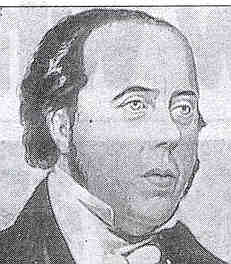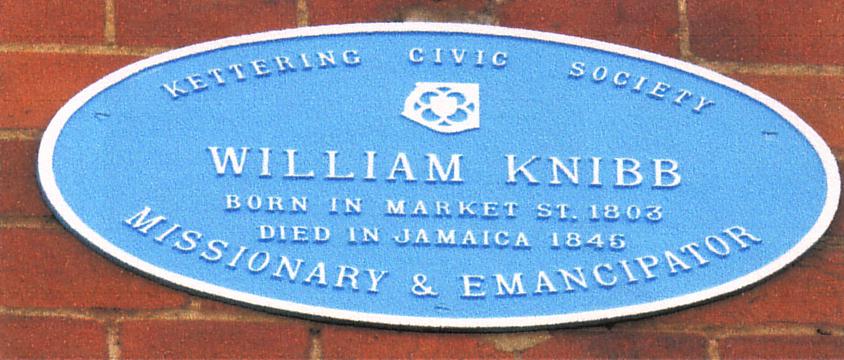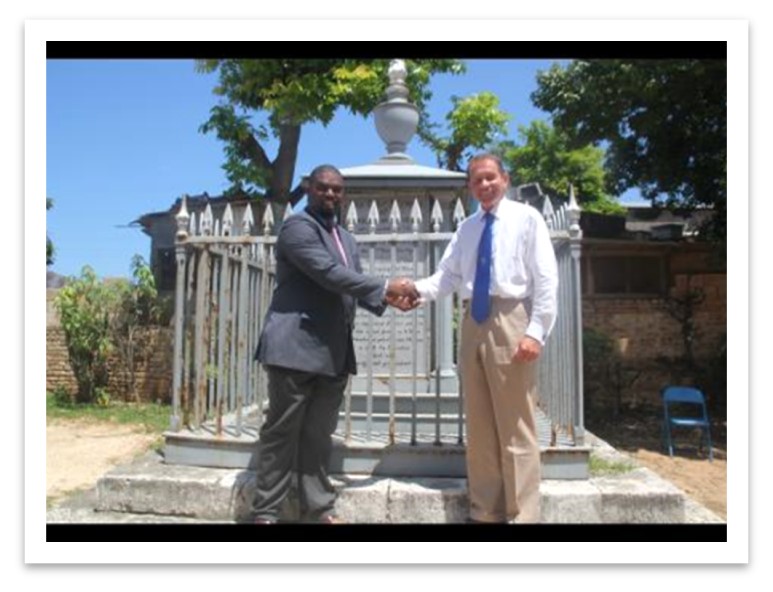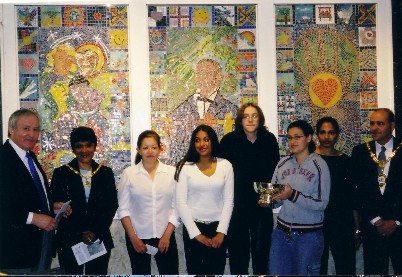
Kettering Civic
Society
William Knibb

The Kettering Mural | Kettering Railway Station | Tony Ireson & Beech Cottage | Ted Wright | Robert Mercer | John Smith | HE Bates | Michael Faraday | William Knibb
Sir Alfred East | Frank Bellamy | Thomas Cooper Gotch | Tony Ireson | J L Carr | Charles Wicksteed | John Alfred Gotch



PUBLIC ART FOR WILLIAM KNIBB
There have been new developments following ‘Black Lives Matter’ news. Following a petition to MP Philip Hollobone which was started by former Bishop Stopford student, Ben Humphries on Facebook requesting support for a tribute to William Knibb in Kettering, Kettering Civic Society began crowdfunding to fund this. The proposals from the Council Executive Committe is that some form of public art be commissioned to mark this areas historic contribution to the anti-slavery movement and to feature those local people who worked to abolish slavery..
Already contributions have been
received from the following;
Jim Hakewill, George Burgon,
Lyne Powell, Yvonne Hamilton, John, Greta. Jaqueline Knibbs, Frances Pope,
Jenny Thornton,
Mary Page, Don Pilkington, Tom Murphy, John Gorrell Barnes, Diane Bulley,
Graham Bell.
If you would like to contribute donations may
be made via the Society’s Facebook
kett civic
or by cheque made payable to Kettering Civic Society, 1 Headlands,
Kettering, NN15 7ER
or by BAC - HSBC 40-26-07 Kettering Civic Society 1131192 - please email
kettcivic@gmail.com if you pay this way
‘Sharing The Past, Northamptonshire Black History’ ISBN978-0-9557139-1-0
published by Northamptonshire Black History Society Association
‘Civilising Subjects’ by
Catherine Hall
View a Video about William Knibb by The Crown Christian Heritage Trust
William Knibb also features on our Blue Plaque Trail page and our Rose Bowl Awards page
A greater understanding of the life of William Knibb has recently widened our appreciation of his contribution to society. Her certainly left Kettering and its Mission House to go to Jamaica. The Civic Society placed a plaque in Market Street in his honour as we appreciated his religious intentions. The Reverend Doreen Morrison widened our understanding of his original Christian understanding through her academic studies. There are many ways of academic exploration and Catherine Hall, Emeritus Professor of History at UCL interpreted the life and work of William Knibb such that it made possible the commissioning of public artwork here in Kettering in his honour. Philip Hollobone, the Kettering MP visited Jamaica and saw a Monument in William Knibbs honour of Trewlawny erected by the emancipated slaves. 150 years later, he was awarded Jamaica’s Order of Merit for his work. Black people were taken as slaves from Africa and after very many years were granted their freedom. Their role in society has not changed in that they are still “black”, now resident in many parts of the world and frequently drawn into white mans violence. We have now seen their social contribution through people such as Prime Minister Barack Obama which is always welcome. In Commemorating William Knibb with public artwork, putting into perspective the respect the Civic Society and Kettering, the equal place black people have in our Society and would welcome the gesture as part of our Civic Pride. Paul Ansell (Chairman)

SEPTEMBER 2017 Phillip Hollobone, Member of Parliament for Kettering, shakes
hands with the Reverend Devere Nugent on the steps of the monument that was
erected in memory of William Knibb at the Baptist Church in Falmouth,
Trelawny, Jamaca.
The Inscription on the memorial reads
'This monument was erected by the emancipated slaves to whose enfranchisement and elevation his indefatigable exertions so largely contributed; by his fellow labourers who admired and loved him, and deeply deplore his early removal; and by friends of various creeds and parties, as an expression of their esteem for one whose praise as a man, a philanthropist, and a Christian minister, is in all the churches, and who being dead, yet speaketh.'
William Knibb arrived in the land of "sin disease and death" and was outraged at the ill-treatment and moral degradation of the slaves imported from Africa. He soon became a thorn in the side of the plantation basses who were exploiting the situation.
Local Hero who freed the slaves - a tribute to 'King' Knibb - from an article by Tony Smith in the Evening Telegraph 6/6/02
You don't need to he a student of local history to be aware of legendary missionary William Knibb, after whom a youth and education centre in Montagu Street, Kettering, is named. His crucial role in the education and emancipation of, slaves In the British colonies in the 19th century is recognised in his home town's coat of arms, which features a black man with broken manacles.
A book paying tribute to the work of Knibb and his fellow campaigners in the West Indies has been published by a Kettering-born university professor, whose father was a minister at Fuller Baptist Church, which helped found the world-wide Baptist Missionary Society In 1792. Civilising Subjects (Polity Press, £19.99) is written by Catherine Hall, Professor of Modem British Social and Cultural History at University College, London.
She was three when her family left Kettering in 1949 for Leeds, where her father, the Rev John Barrett, was appointed area superintendent of the Baptist Union. But it wasn't until 1988, when she and husband Stuart had gone to live In his native Jamaica, that she stumbled across a small village called Kettering and her curiosity about its origins led to intensive research which eventually resulted in the book.
The village was founded by Knibb as the base for his Christian mission and his stirring public addresses against the evil slave trade were instrumental in -Its abolition in the colonies in 1833. It was at his Island home that the golden jubilee of the Baptist Missionary Society was celebrated and where he died, aged 44, of yellow fever.
"King Knibb", as he was known by those he helped free, was born in Market Street and educated at Kettering Grammar School.
In 1823 he was Rent to Jamaica as a missionary to replace his brother Thomas, who died teaching in Kingston, and after arriving with new wife Mary, he wrote to a friend: "I have now reached the land of sin, disease and death." Outraged by the ill-treatment and moral degradation of mostly negro slaves imported from Africa, he soon became an outspoken thorn in the side of plantation bosses. When a revolt by slaves broke out in 1831, he was arrested by the Jamaican government, which blamed missionaries for stirring up unrest.
On visits home, Knibb lectured passionately throughout Britain to rally support for abolition. He envisioned a world where freed black men and white missionaries could build a new society and dreamed of an independent Jamaica, governed by black freeholders. "Such a dream was built, however, on the refusal to recognise An existing black culture," writes Prof Hall in her diligently researched book, "For, once established, the free villages could not be maintained In the missionary image."
After abolition, plantation owners felt Knibb - by then recognised leader of the missionaries in Jamaica - still posed a threat to their interests, some suspecting he had ambitions of becoming ruler of the colony. He had houses in both the villages of Kettering and nearby Falmouth with horses and servants, among them two African girls he rescued from a captured slave ship.
When Knibb died, his wife Mary stayed in Jamaica until her death in 1867. Today their graves are in the churchyard of the present William Knibb Memorial Chapel, in Falmouth, erected after the old chapel he founded was destroyed in a hurricane in 1944, Prof Hall argues that the missionary dream relied on willing lieu- tenants who would extend the work of the white pastors, but there were many tensions and clashes between the missionaries.
The author concludes.' "While the early 1840s represented the high point of missionary hopes, fractures were already evident within the Baptist family. The death of Knibb marked the ending of the high watermark of post-emancipation missionary dreams."
William Knibb - A Champion of Freedom - from an article by Tony Smith in the Evening Telegraph 1/12/00
The crucial role played by Kettering in the education and emancipation of slaves in the British colonies is symbolised in the borough's coat of arms. The circles at the top of the shield represent the founding of the worldwide Baptist Missionary Society in the town's Lower Street in 1792. The black slave on the right with broken manacles a tribute to one of its most famous members, the freedom champion William Knibb. Slavery was rife in the British Empire during the late 18th century and was,outlawed in 1807 after opposition led by the likes of the philanthropist William Wilberforce. Although this made it illegal for British ships or for British colonies to import them, in was 1803 before it was abolished in the colonies themselves following a campaign by Knibb
The former Kettering Grammar School pupil, born in Market Street in 1806 was sent to Jamaica as a missionary to replace his eldest brother Thomas, who had died, suddenly in Kingston in 1824. Full of zeal William became pastor of a church at Falmouth on the island but was horrified by the ill-treatment of sugar plantation workers, mostly negro imported on slave ships from Africa. Unlike fellow missionaries, Knibb,dared to speak out against such cruelty and injustice. When a revolt by slaves broke out in 1831, he was arrested by the Jamaican government, which blamed the, missionaries for stirring up unrest. On returning to England the following year, Knibb tirelessly lobbied the church, Parliament and the House of Lords, vowing: "I will not rest day or night till this accursed thing is swept from the face of the earth". In a landmark speech to the Baptist Missionary Society, he spoke passionately of the horrors of slaughtered negroes and their families, imprisoned missionaries and demolished chapels. "I plead on behalf of the widows and orphans whose innocent blood has been shed," he said, "I call upon children by the cries of the Want slave whom I saw flogged on the Macciesfield estate. I call upon parents by the blood streaming from the back of Catherine Williams, who, with a heroism England has seldom known, preferred the dungeon to the surrender of her honour. "I call upon Christians by the bleeding wounds of William Black, whose back a month after flogging was not healed
The excitement of the meeting was indescribable. After similar emotive meetings, throughout England, a Reform Bill abolishing slavery was eventually passed.
As the clock struck midnight on July 31, l838, 800,000 negro workers in the West Indies were finally declared free (and their former owners handsomely compensated) Although William arrived back in Jamaica too late for Emancipation Day, he was mobbed at the bay by hundreds of jubilant people from ever corner of the island. Amid much weeping, laughing and singing the crowds hailed him as "King" Knibb". In subsequent years, thousands flocked to the churches in the colonies. Numbers of Christians rose from 4,000 in 1825 to 27,607 in 1840, Knibb himself baptising 6,000 converts. Largely through his efforts, 35 chapels, 16 schools and 24 mission house, were erected at a cost of £157,000, of which the people raised £139,000. Knibb returned here in 1842 to celebrate the golden jubilee of the BMS at the Mission House in Kettering. Following a final fundraising mission to England inouth in Jamaica and named after his beloved birthplace. He died there of yellow fever in 1847. Today Kettering Baptist Church founded by Knibb in 1544 survives on the island along with the William Knibb Memorial High School. In Kettering, England, a bronze bust of the missionary is display, in the Manor House Museum and a youth education centre in Montagu Street bears his name.

The mosaic which the group designed and made includes an image of William Knibb, it can be seen in the Newlands shopping centre.
Top | William Knibb features on our Blue Plaque & Silver Rose Bowl pages